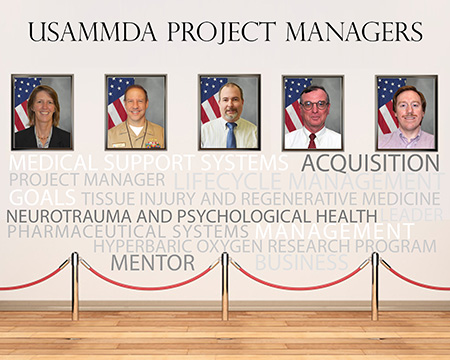Project Managers: Leaders and Mentors

Each of the five different project management offices at U.S. Army Medical Materiel Development Activity is made up of individuals carefully chosen to meet the specific needs of the mission. The leader of each team is the project manager.
"The USAMMDA project manager develops and delivers solutions for the Warfighter to meet military objectives," said Kristy Pottol, project manager of the Tissue Injury and Regenerative Medicine PMO.
To be successful, a project manager needs a specific skill set, which starts with getting an educational degree. According to Steve Hawbecker, project manager of the Medical Support System PMO, a technical or business degree is most suitable, because running a PMO is similar to running a business. The project manager develops the strategic vision of the PMO and directs its team to meet its goals.
A project manager should also have Department of Defense Acquisition experience and an understanding of the U.S. Federal Drug Administration development life cycle. In the case of the Medical Support System PMO, one must be familiar with the Environmental Protection Agency's process.
Another requirement is a knowledge base of project management principles and experience, whether that background comes from working in the government or in the commercial world.
"You must have diverse work experience to become a project manager, because each project is something that is temporary and unique in that it has never been done before and will never happen again," said Pottol. "The project manager needs to be comfortable with uncertainty and with gathering a team to make a path forward toward success."
The members of the PMO staff assigned to guide products through the acquisition system are called product managers. The project manager needs to make sure that the product managers have the right experience, network connections, and resources to get their products through the acquisition process. They review project plans to make sure product managers are set up for success.
Project managers balance resources and assets to meet product schedules. They look to the future, planning the portfolio six years out. They make sure that regulations are properly navigated, that funding is available, and that any other support the product managers need to do their jobs is available.
"The project manager is a mentor and a motivator to the product managers," said Hawbecker.
They are the ultimate resource for the product managers. They resolve any problems the product manager may face. Hawbecker encourages his product managers to develop their own project management skills in order to grow in their careers. For example, in addition to their required product briefings, he may have them present optional senior-level briefs to Congressional representatives. Or, he may have them expand their expertise by assisting in the building of a Program Objective Memorandum, which provides a six-year strategic plan of proposed projects and costs.
The project manager is responsible for keeping the team abreast of new information (e.g. a new FDA ruling) that comes their way. It is important to know if new information will affect a product in development. If a new technology will affect the current path a product is taking, or if a new product comes to market that accomplishes what the PMO's product will achieve, then adjustments will need to be made.
Project managers gather a variety of resources to stay up to date on the news specific to their field of development. Each project manager cultivates a network of contacts across all the different government agencies. Pottol also interacts with medical advisors and regulatory scientists, who monitor filings at the U.S. Food and Drug Administration. Her PMO participates in the Health & Human Services Biomedical Advanced Research and Development Authority tech watch, which provides information on the latest technologies in the public health arena.
How a project manager interacts with their product managers differs with each PMO. Pottol holds weekly meetings and encourages a learning environment where product managers learn from each other's experiences. While Hawbecker holds quarterly meetings, he encourages his product managers to collaborate regularly with each other to gain efficiencies from lessons learned and best practices. However, he does encourage them to collaborate with each other to gain efficiencies. Both project managers meet with their product managers regularly on a one-on-one basis.
Project managers also need to keep stakeholders up to date with their PMO's developments. A stakeholder is anyone who is impacted by or impacts the project. The scope of information presented is tailored to the recipient's needs, depending on their relationship to the project.
Combining their well-developed management skills with their knowledge of the latest technology helps project managers guide their team on the path to success. Regardless of their management styles, all project managers have one goal in mind: Getting products successfully through the acquisition process and into the hands of the Warfighter.













